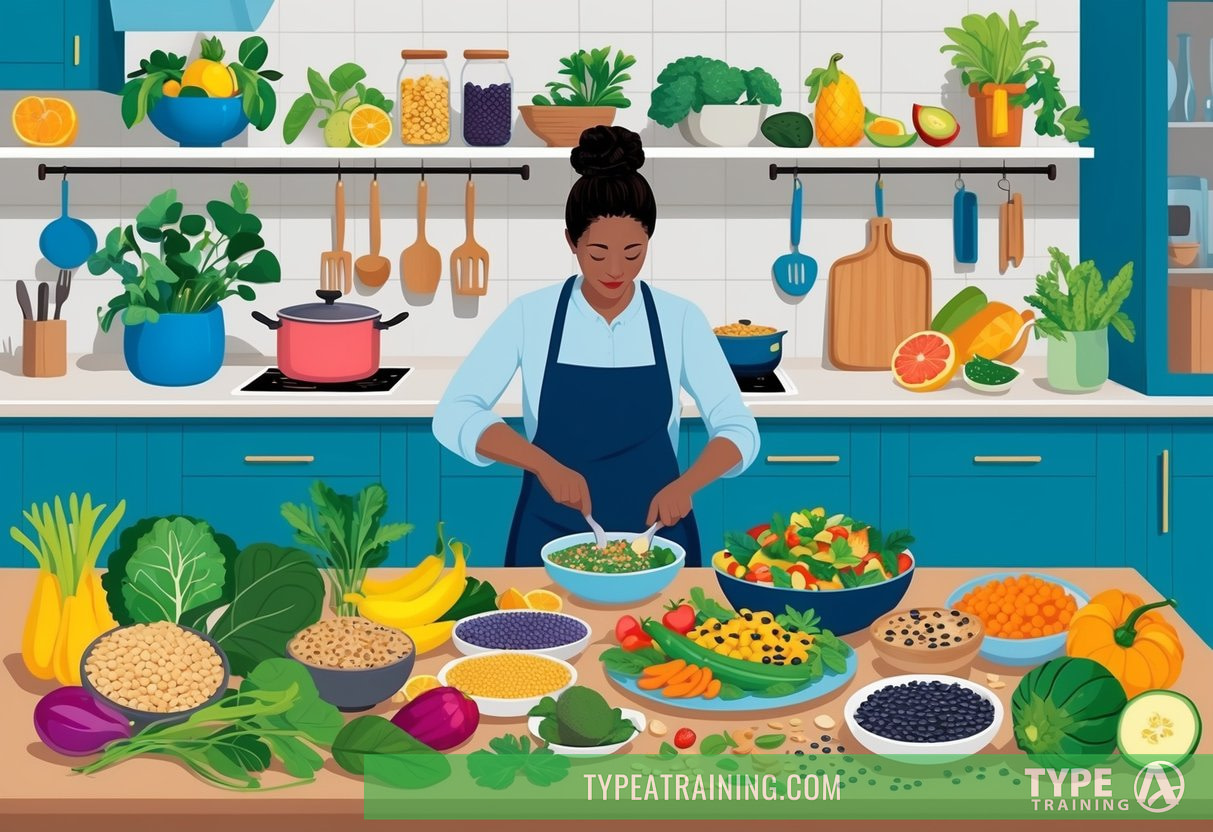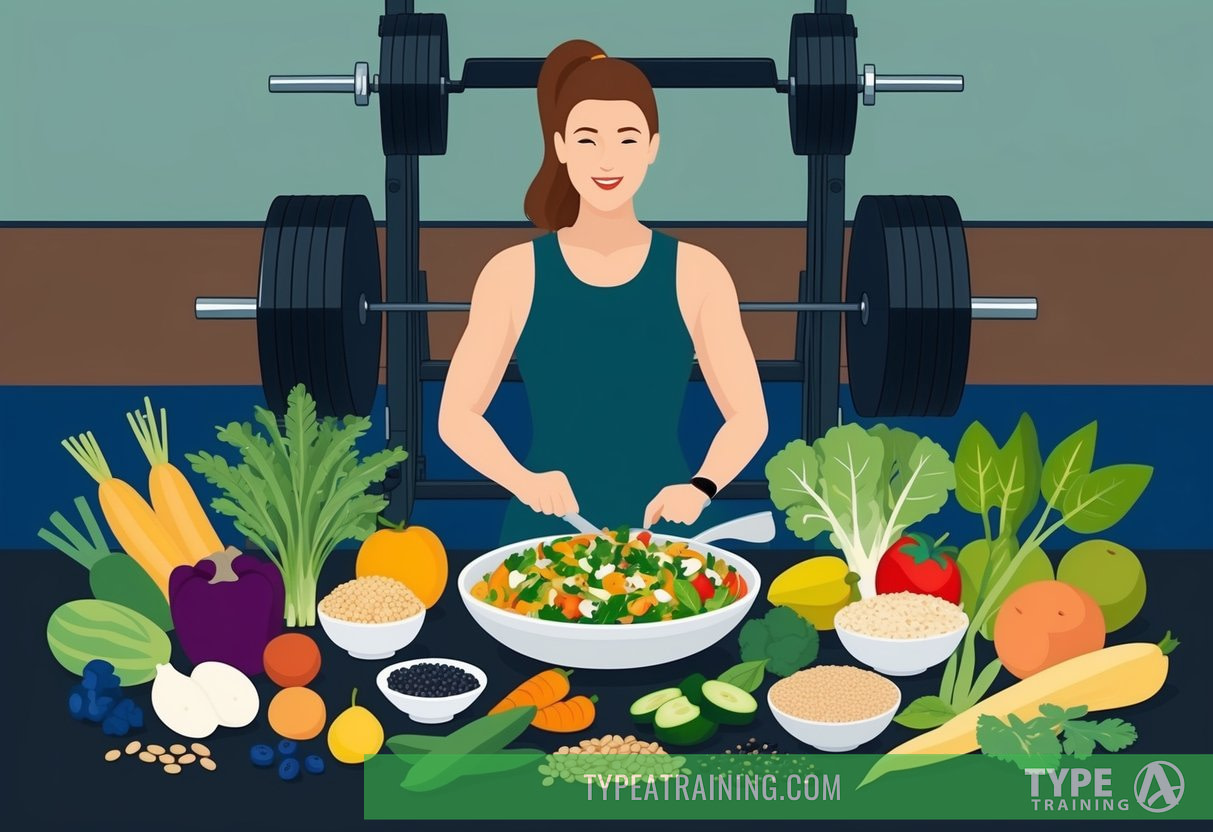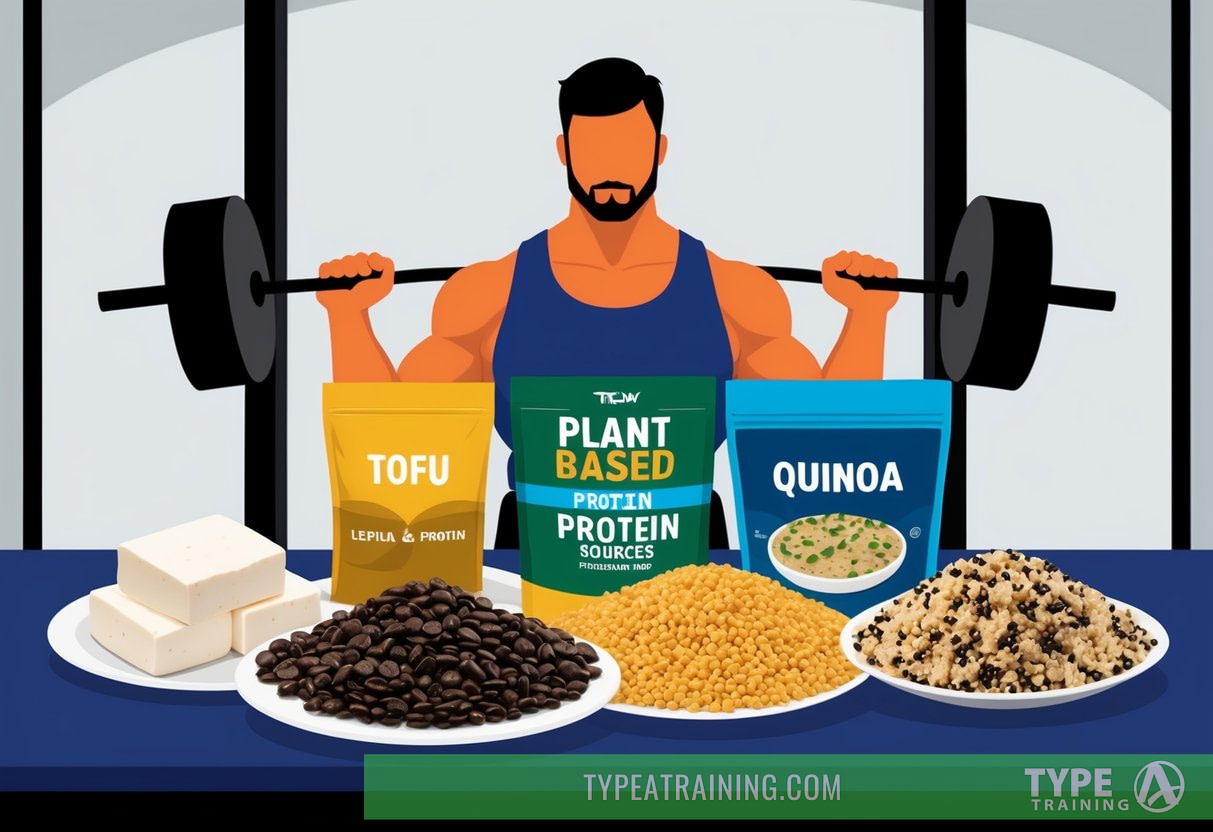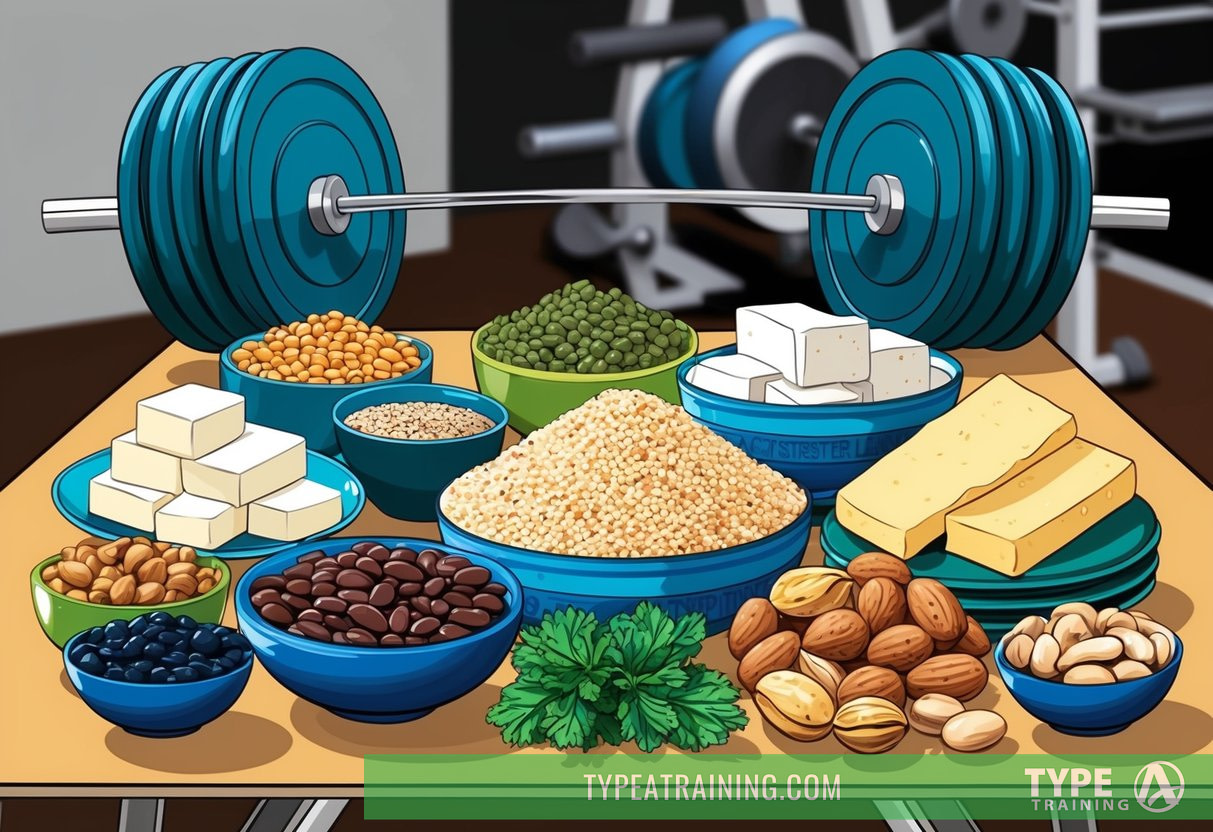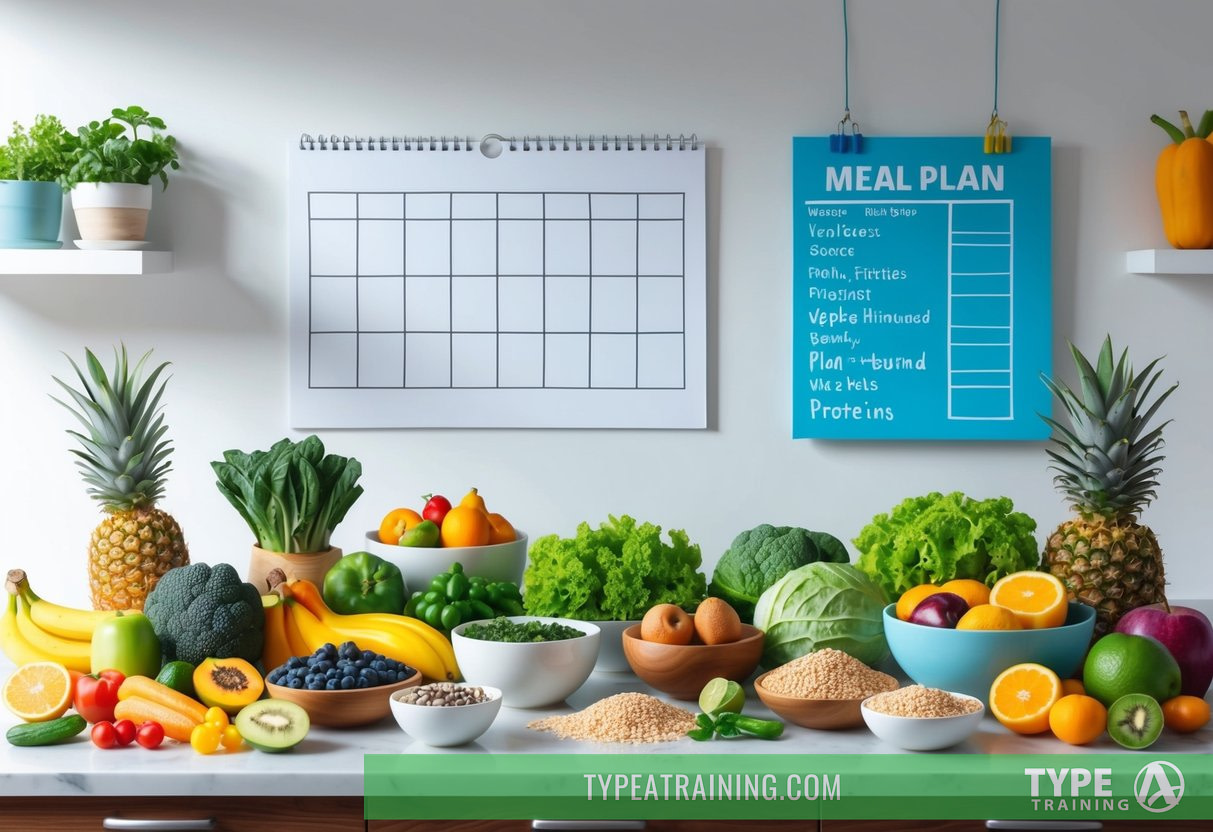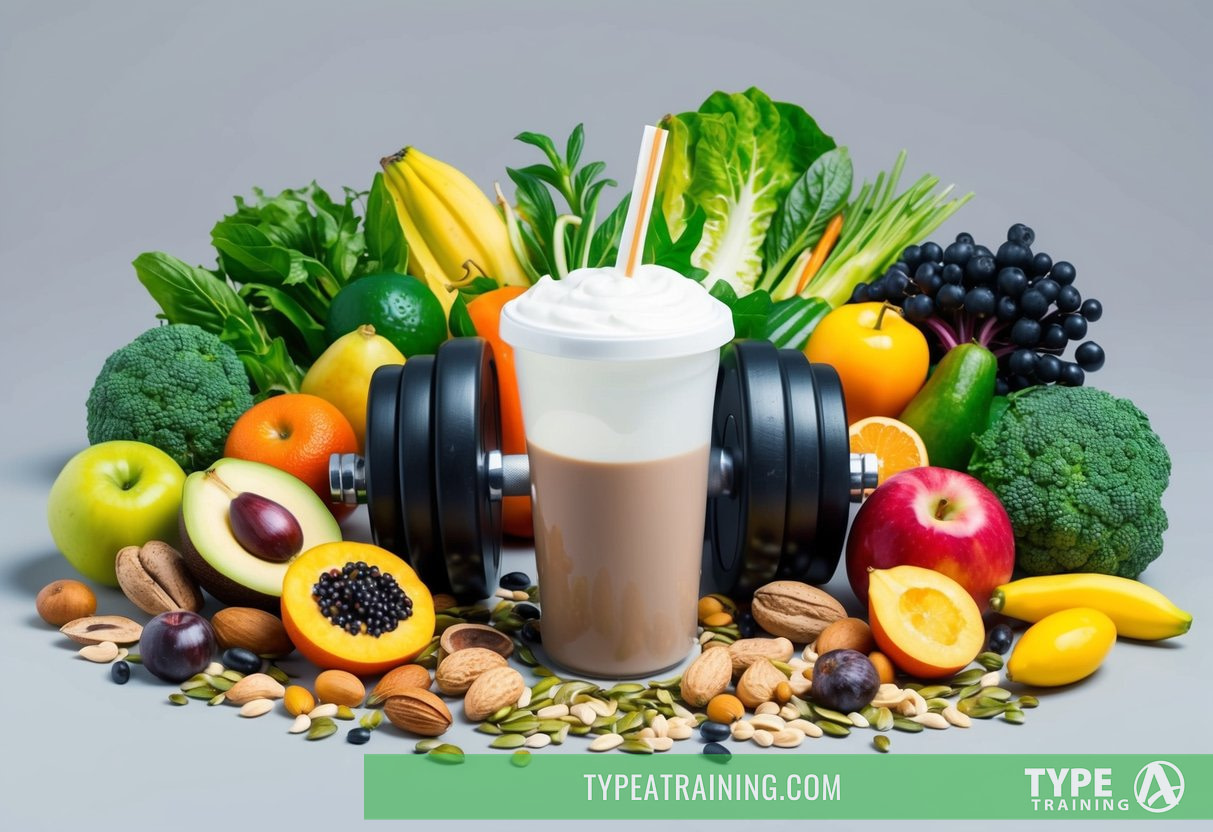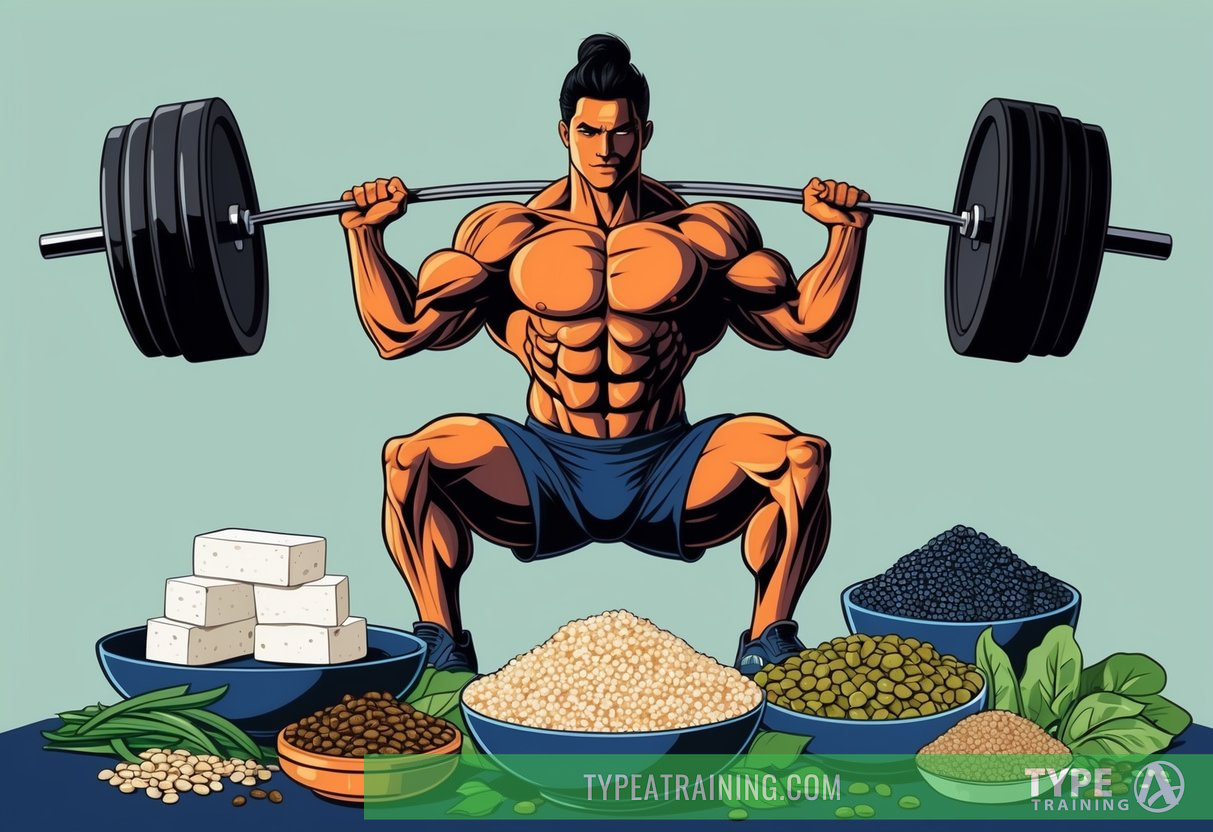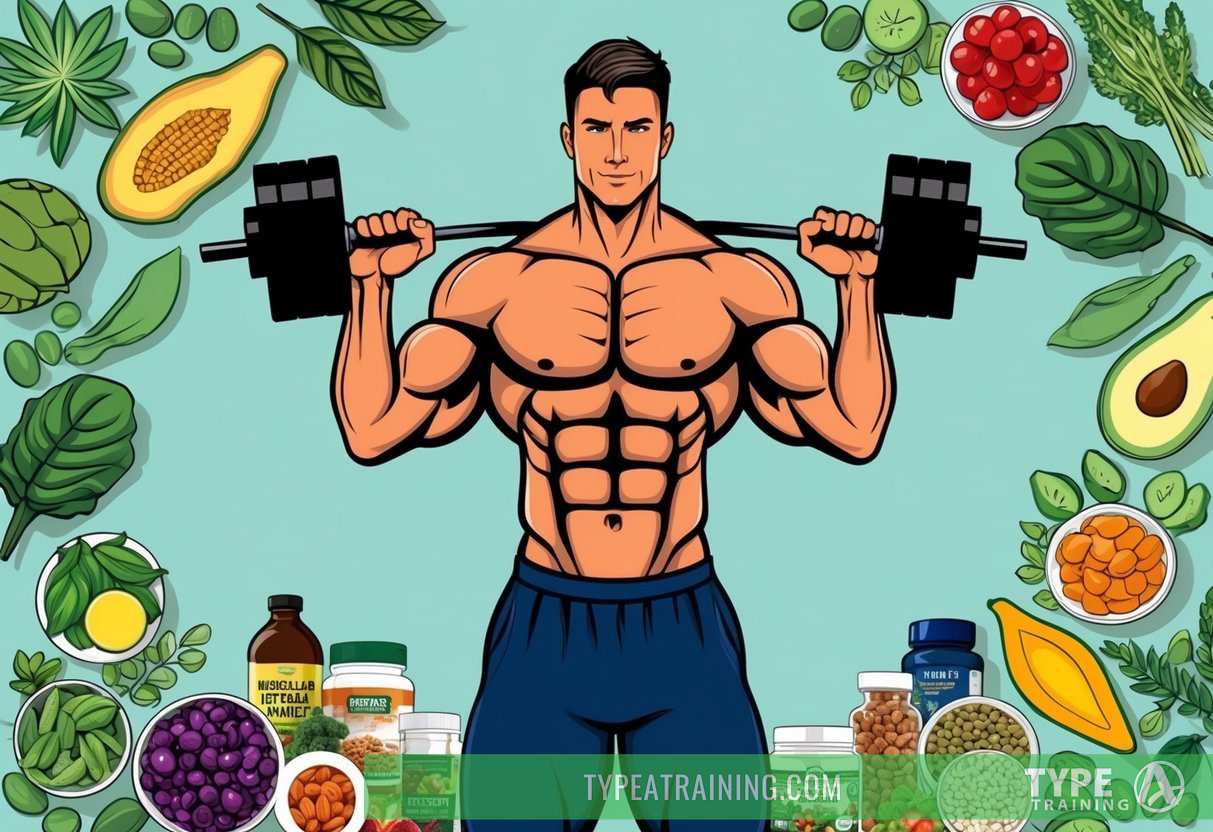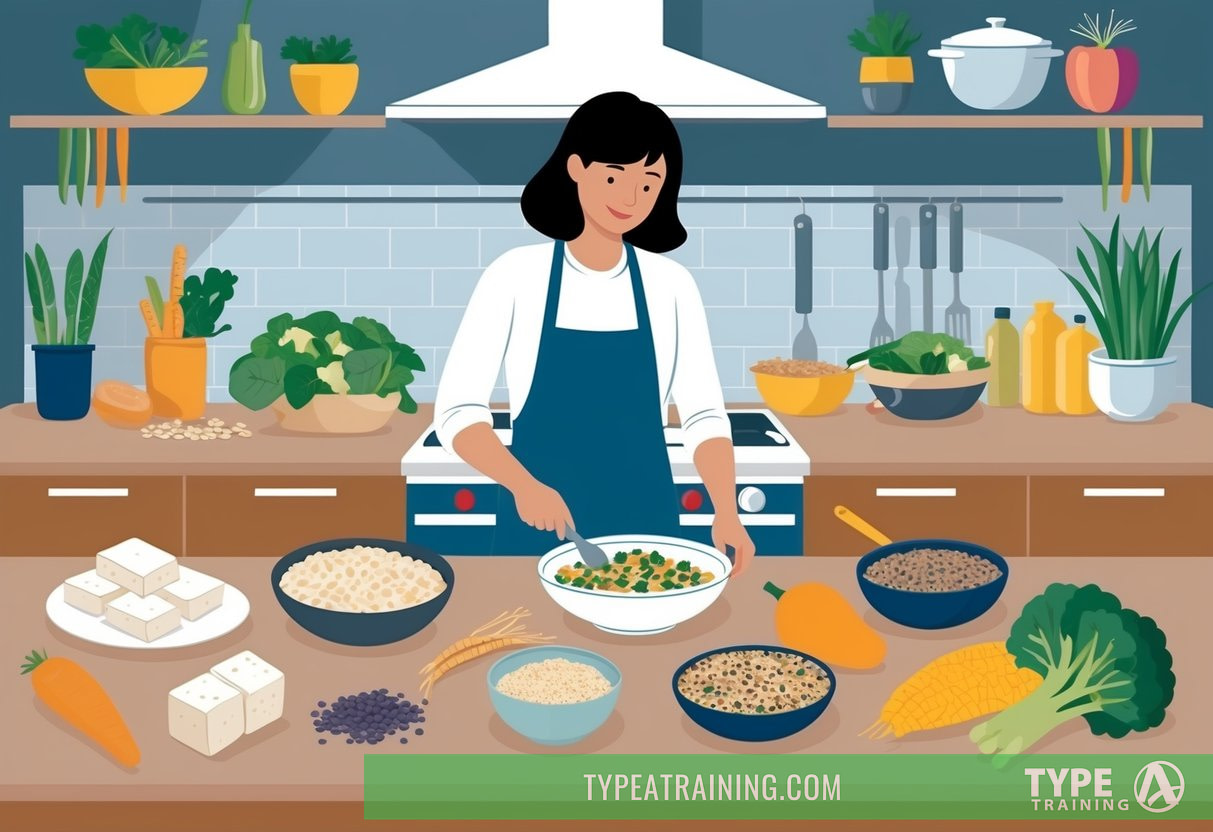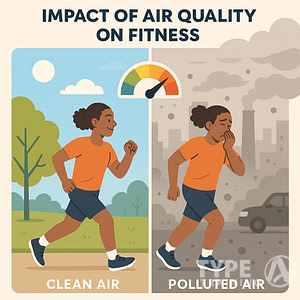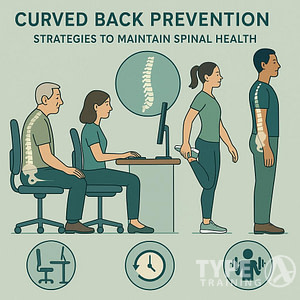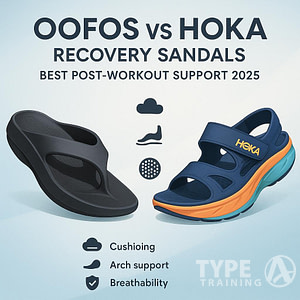Building muscle on a plant-based diet is not only possible but can be highly effective. Many athletes and bodybuilders have successfully achieved impressive muscle gains while following a Plant Based Diet or vegetarian lifestyles. A Plant Based Diet offers all the necessary nutrients for muscle growth.
The key to success lies in consuming a variety of nutrient-dense plant foods and ensuring adequate calorie intake.
The benefits of a Plant Based Diet include its ability to provide ample protein for muscle repair and growth, making it an excellent choice for athletes.
Popular posts:
Whole grains, legumes, nuts, seeds, and vegetables form the foundation of a muscle-building plant-based diet. These foods offer a perfect combination of protein, complex carbohydrates, and healthy fats needed for optimal muscle development.
Proper meal planning and timing are crucial for maximizing muscle gains on a Plant Based Diet.
A well-balanced Plant Based Diet includes diverse food sources that promote optimal muscle function and recovery.
Incorporating protein-rich foods at each meal and snack helps maintain a steady supply of amino acids for muscle repair and growth. Pairing plant protein sources can also enhance the overall amino acid profile of your meals.
Key Takeaways
- A well-planned Plant Based Diet provides all essential nutrients for muscle growth
- A well-planned Plant Based Diet provides all essential nutrients for muscle growth, especially important for serious bodybuilding.
- Consume a variety of whole plant foods to meet protein and calorie requirements
- Proper meal planning and timing are crucial for maximizing muscle gains
Fundamentals of Muscle Growth
Building muscle on a plant-based diet relies on the same core principles as any other approach.
These fundamentals center around stimulating muscle growth, providing proper resistance, and allowing adequate recovery time.
To maximize the effectiveness of a Plant Based Diet, ensure you focus on nutrient timing and include protein-rich sources at every meal.
Understanding Muscle Hypertrophy
Muscle hypertrophy refers to the increase in muscle size through exercise. This process occurs when muscle fibers experience micro-tears from resistance training. Your body then repairs these fibers, making them larger and stronger.
Protein synthesis can be effectively achieved through a Plant Based Diet, utilizing combinations of legumes, nuts, and soy products.
Protein synthesis is crucial for this repair process. Plant-based athletes can easily meet their protein needs through sources like legumes, nuts, and seeds.
Hormones also play a key role in muscle growth. Resistance training stimulates the release of growth hormone and testosterone, which aid in muscle development.
Role of Resistance Training
Resistance training is essential for building muscle. It involves exercises that force your muscles to work against an external force, typically weights or bodyweight.
Incorporating a Plant Based Diet, especially with high-protein foods, can significantly enhance resistance training outcomes.
Progressive overload is a key principle. Gradually increase the weight, frequency, or number of repetitions to continually challenge your muscles.
Focus on compound movements like squats, deadlifts, and pull-ups. These exercises engage multiple muscle groups simultaneously, promoting overall muscle growth.
Aim for 3-4 resistance training sessions per week. Allow at least one day of rest between workouts for the same muscle group.
Importance of Rest and Recovery
Rest is when your muscles actually grow. During sleep, your body releases growth hormone and repairs muscle tissue.
Rest is when your muscles actually grow, and a Plant Based Diet supports this by providing the nutrients necessary for recovery.
Aim for 7-9 hours of quality sleep each night. Create a consistent sleep schedule and a relaxing bedtime routine.
Proper nutrition is crucial for recovery. Consume a balanced meal with plant-based proteins and complex carbohydrates after your workout.
Active recovery, like light stretching or yoga, can help reduce muscle soreness and improve flexibility.
Adequate rest also supports your immune function, which is essential for overall health and consistent training.
Nutritional Considerations
Proper nutrition is crucial for building muscle on a plant-based diet. Focusing on the right balance of macronutrients, ensuring adequate micronutrient intake, and managing caloric needs are key factors for success.
For a successful Plant Based Diet, focus on protein-rich foods that provide adequate energy and nutrients for muscle building.
Macronutrient Ratios
Protein is essential for muscle growth. Aim for 1.6-2.2 grams of protein per kilogram of body weight daily.
Good plant sources include:
- Legumes (beans, lentils, peas)
- Tofu and tempeh
- Seitan
- Quinoa
- Hemp seeds
Carbohydrates fuel your workouts. Complex carbs should make up 45-65% of your diet:
Including healthy fats in your Plant Based Diet is crucial for hormone production, which supports muscle growth.
- Whole grains
- Sweet potatoes
- Oats
- Brown rice
Healthy fats support hormone production. Include 20-35% of calories from fats:
- Avocados
- Nuts and seeds
- Olive oil
- Coconut
Essential Micronutrients
Micronutrients from a Plant Based Diet can enhance recovery and muscle health, making it essential for serious athletes.
Plant-based diets can be rich in micronutrients, but some require extra attention:
Iron: Found in leafy greens, legumes, and fortified foods. Pair with vitamin C for better absorption.
Vitamin B12: Supplement or consume fortified foods, as it’s not naturally present in plants.
Calcium: Obtain from fortified plant milks, leafy greens, and tofu processed with calcium sulfate.
Zinc: Present in whole grains, nuts, and seeds. Consider a supplement if intake is low.
Omega-3 fatty acids: Include flaxseeds, chia seeds, and walnuts. Consider an algae-based supplement for EPA and DHA.
Balancing Caloric Intake
To build muscle, you need to consume more calories than you burn.
Calculate your basal metabolic rate and add calories based on activity level.
Increase caloric intake by 10-20% above maintenance. Focus on nutrient-dense, calorie-rich foods:
-
- Nut butters
- Dried fruits
- Smoothies with plant-based protein powder
Plant Based Diet options like smoothies with protein powder can be a great way to boost daily protein intake for muscle gain.
- Whole grain pasta
Monitor your progress and adjust intake as needed. If you’re not gaining muscle, gradually increase calories. If you’re gaining too much fat, slightly reduce intake.
Optimizing Plant-Based Protein Sources
Building muscle on a plant-based diet requires strategic selection and combination of protein-rich foods. Focusing on high-quality plant proteins and understanding their role in muscle synthesis can significantly enhance your results.
Discovering High-Quality Plant Proteins
Legumes are powerhouses of plant-based protein. Lentils, black beans, and chickpeas offer substantial protein content along with fiber and essential nutrients. Incorporate these into your meals regularly.
Soy products like tofu, tempeh, and edamame are complete proteins, containing all essential amino acids. They’re versatile and can be prepared in various ways to suit your taste preferences.
Incorporate soy products into your Plant Based Diet to ensure you’re getting complete proteins for muscle synthesis.
Quinoa stands out among whole grains due to its complete amino acid profile. It’s an excellent base for protein-packed meals.
Consider adding nutritional yeast to your dishes. It’s rich in protein and B-vitamins, making it a valuable addition to plant-based diets.
Incorporating Complete Protein Combinations
While some plant proteins are complete, others may lack certain amino acids. Combine different protein sources to ensure you’re getting all essential amino acids.
Pair legumes with whole grains. For example, enjoy a bowl of brown rice with black beans.
Mix nuts and seeds into your meals. They provide protein and healthy fats. Try adding pumpkin seeds to your salads or almond butter to your smoothies.
Experiment with different combinations to keep your meals interesting and nutritionally balanced.
Plant Protein in Muscle Synthesis
Plant proteins can effectively support muscle synthesis when consumed in adequate amounts.
Focus on leucine-rich foods, as this amino acid plays a crucial role in muscle protein synthesis.
Soy products and legumes are good sources of leucine. Include them in your post-workout meals to support muscle recovery and growth.
Ensure you’re consuming enough protein throughout the day. Aim for 1.6-2.2 grams of protein per kilogram of body weight to optimize muscle growth.
Spread your protein intake across multiple meals. This approach can help maintain a positive protein balance and support continuous muscle synthesis.
Effective Meal Planning for Muscle Gain
Planning nutrient-dense meals is crucial for building muscle on a plant-based diet. Focusing on whole foods, protein variety, and caloric surplus will optimize your gains.
Planning nutrient-dense meals is crucial for building muscle on a Plant Based Diet; it ensures you meet protein and caloric goals.
Creating a Balanced Meal Plan
Build your meals around diverse plant proteins. Include legumes, tofu, tempeh, seitan, and high-protein grains like quinoa. Aim for 1.6-2.2 grams of protein per kilogram of body weight daily.
Add complex carbohydrates from whole grains, fruits, and starchy vegetables. These provide energy for workouts and recovery.
Incorporate healthy fats from nuts, seeds, and avocados. They help with hormone production and nutrient absorption.
Don’t forget leafy greens and colorful vegetables for micronutrients. These support overall health and muscle function.
Sample meal plan:
- Breakfast: Tofu scramble with spinach and whole grain toast
- Snack: Apple with almond butter
- Lunch: Lentil and quinoa bowl with mixed vegetables
- Snack: Smoothie with plant-based protein powder and berries
- Dinner: Tempeh stir-fry with brown rice and broccoli
Strategies for Bulking Up
To gain muscle, you need to eat in a caloric surplus. Increase your daily calorie intake by 300-500 calories above maintenance level.
Track your food intake using an app to ensure you’re meeting your calorie and macronutrient goals. Adjust as needed based on your progress.
Eat frequent meals, aiming for 4-6 per day. This helps you consume enough calories and provides a steady supply of nutrients to your muscles.
Include calorie-dense foods like nuts, seeds, and dried fruits. Add them to meals or eat as snacks to boost your calorie intake easily.
Prepare meals in advance to ensure you always have nutrient-rich options available. This helps you stay consistent with your eating plan.
Hydration and Muscle Function
Proper hydration is essential for muscle growth and function. Aim to drink at least 8-10 glasses of water daily.
Increase your water intake on workout days. Drink before, during, and after exercise to replace fluids lost through sweat.
Consider coconut water or homemade electrolyte drinks for intense workouts. These help replenish electrolytes and support muscle function.
Hydration plays a vital role in muscle function, and a Plant Based Diet can help provide the fluids needed throughout the day.
Monitor your urine color. It should be pale yellow. If it’s dark, you need to drink more water.
Eat water-rich fruits and vegetables. They contribute to your daily fluid intake while providing valuable nutrients.
Lifestyle Factors Influencing Muscle Development
Building muscle on a plant-based diet requires more than just proper nutrition. Your daily habits and routines play a crucial role in muscle growth and recovery.
Managing Stress and Inflammation
Chronic stress can hinder your muscle-building efforts. High cortisol levels may lead to muscle breakdown and impair recovery. To combat this, incorporate stress-reduction techniques into your routine:
- Practice meditation or deep breathing for 10-15 minutes daily
- Engage in yoga or gentle stretching
- Take regular breaks during work
Inflammation can also impede muscle growth. Focus on anti-inflammatory foods:
- Berries
- Leafy greens
- Nuts and seeds
- Turmeric and ginger
These foods support muscle health and aid in recovery after intense workouts.
The Impact of Sleep on Muscle Recovery
Quality sleep is essential for muscle growth and repair. Aim for 7-9 hours of sleep per night to optimize your body’s natural recovery processes.
Tips for better sleep:
- Stick to a consistent sleep schedule
- Create a dark, cool sleeping environment
- Avoid screens 1-2 hours before bed
- Limit caffeine intake after 2 PM
During deep sleep, your body releases growth hormone, which is crucial for muscle development and repair. Prioritizing sleep can significantly enhance your plant-based muscle-building journey.
Avoiding Common Pitfalls
To maximize muscle growth on a Plant Based Diet, avoid common pitfalls like undereating and relying on processed foods.
To maximize your muscle-building potential on a vegan diet, steer clear of these common mistakes:
- Undereating: Plant-based foods are often less calorie-dense. Ensure you’re consuming enough calories to support muscle growth.
- Relying on processed foods: While convenient, many vegan processed foods are high in sodium and unhealthy fats. Focus on whole foods for optimal nutrition.
- Neglecting resistance training: Strength training is crucial for muscle development. Incorporate progressive overload into your workouts.
- Insufficient protein variety: Combine different plant protein sources to ensure you’re getting all essential amino acids.
Choosing Supplements Wisely
Supplements can complement a Plant Based Diet, especially for nutrients that may be low in vegan sources.
Supplements can play a key role in supporting muscle growth on a plant-based diet. Careful selection of specific nutrients can help fill potential gaps and optimize your results.
When and What to Supplement
Vitamin B12 is essential for those following a vegan diet. Consider taking a B12 supplement daily or every few days to maintain adequate levels. Iron is another nutrient to monitor, especially for women. If blood tests show low iron, a supplement may be beneficial.
Omega-3 fatty acids support muscle recovery and overall health. Algae-based omega-3 supplements provide EPA and DHA, which are harder to obtain from plant sources alone.
Zinc is important for muscle growth and immune function. Plant-based sources exist, but a supplement can ensure you meet your needs.
Protein Powders and Alternatives
Plant-based protein powders can be a convenient way to boost your protein intake. Pea, rice, and hemp protein are popular options. Look for blends that provide a complete amino acid profile.
Soy protein isolate is another effective choice, offering a high protein content and all essential amino acids.
Consider whole food alternatives like nuts, seeds, and legumes for added protein. These provide additional nutrients and fiber.
Creatine monohydrate is a well-researched supplement that can enhance muscle growth and strength. It’s suitable for vegans and can be particularly beneficial on a plant-based diet.
Creatine can enhance muscle growth on a Plant Based Diet, making it a beneficial addition for those looking to bulk up.
Physical Training Guidelines
Building muscle on a plant-based diet requires a well-structured approach to physical training. Proper workout routines, progressive overload, and recovery techniques are essential for optimal muscle growth.
Developing a Structured Workout Routine
Focus on compound movements that engage multiple muscle groups simultaneously. Squats, deadlifts, bench presses, and rows should form the core of your routine.
Incorporating compound movements while following a Plant Based Diet is essential for comprehensive muscle engagement.
Aim for 3-4 strength training sessions per week, targeting different muscle groups each time. Structure your workouts with 3-4 sets of 8-12 repetitions for each exercise.
Include a mix of pushing and pulling movements to ensure balanced muscle development. Consider adding isolation exercises to target specific muscle fibers and enhance overall muscle growth.
Incorporating Progressive Overload
Gradually increase the demands on your muscles to stimulate continuous growth. Add weight to your lifts as you get stronger, aiming for a 2.5-5% increase when you can complete all reps with good form.
Alternatively, increase the number of sets or reps performed. This progressive overload principle is crucial for hypertrophy and strength gains.
Track your workouts meticulously. Use a notebook or app to record weights, sets, and reps. This helps you monitor progress and ensures you’re consistently challenging your muscles.
Recovery Techniques for Optimal Growth
Allow adequate rest between workouts. Aim for 48-72 hours of recovery for each muscle group to prevent overtraining and reduce the risk of injury.
Prioritize sleep, aiming for 7-9 hours per night. Quality sleep is crucial for muscle repair and growth hormone production.
Incorporate active recovery days with light activities like walking or yoga. These help reduce inflammation and promote blood flow to muscles.
Consider foam rolling or massage to alleviate muscle tension and improve flexibility. This can enhance recovery and prepare your body for the next workout session.
Success Stories
Plant-based athletes have achieved impressive results in building muscle and strength. Their experiences demonstrate that a vegan diet can support fitness goals and athletic performance.
Many athletes have proven that a Plant Based Diet can effectively support muscle growth and enhance performance.
Interviews with Plant-Based Athletes
Robert Cheeke, a vegan bodybuilder, gained over 100 pounds of muscle on a plant-based diet. He emphasizes the importance of calorie-dense foods like nuts, seeds, and legumes for muscle growth.
Torre Washington, a professional bodybuilder, switched to a vegan diet in 1998. He credits his plant-based nutrition for improved recovery times and sustained energy during workouts.
Nimai Delgado, an IFBB Pro bodybuilder, has never eaten meat in his life. He maintains his muscular physique through a combination of whole plant foods and targeted supplementation.
Transformation Journeys
Brian Turner, a fitness YouTuber, overcame severe acne and built a muscular physique after adopting a vegan diet. He focuses on high-protein plant foods like tofu, tempeh, and seitan.
Samantha Shorkey became the first vegan WNBF bikini pro champion. She transformed her body by incorporating plant-based protein sources and strength training into her routine.
Jon Venus gained significant muscle mass after switching to a vegan diet. He emphasizes the importance of tracking macronutrients and consistently increasing workout intensity to achieve bodybuilding goals.
Conclusion
Building muscle on a plant-based diet is entirely achievable. With proper planning and dedication, you can reach your fitness goals while following a sustainable lifestyle.
With a well-planned Plant Based Diet, you can achieve impressive muscle growth while supporting your overall health.
Focus on consuming a variety of protein-rich plant foods to meet your daily requirements. Include legumes, nuts, seeds, and whole grains in your meals.
Pay attention to nutrient timing, especially around your workouts. Consume protein and carbohydrates before and after exercise to support muscle growth and recovery.
Supplement wisely to fill any nutritional gaps. Consider adding vitamin B12, vitamin D, and omega-3s to your regimen if needed.
Stay consistent with your resistance training program. Progressive overload and proper form are key to muscle development, regardless of diet.
Remember that a balanced plant-based diet can support long-term health while helping you build muscle. It’s not just about aesthetics, but overall well-being.
Stay committed to your goals and embrace the benefits of a Plant Based Diet for muscle growth and recovery.
Be patient and trust the process. Muscle growth takes time, whether you’re plant-based or not. Stay committed to your goals and enjoy the journey towards a stronger, healthier you.
Frequently Asked Questions
Building muscle on a plant-based diet raises many common questions. Here are answers to some of the most frequently asked topics about vegan muscle gain, nutrition, and meal planning.
What essential nutrients are needed for muscle growth on a plant-based diet?
Protein, complex carbohydrates, and healthy fats are crucial for muscle growth. Ensure adequate intake of iron, zinc, vitamin B12, and omega-3 fatty acids. Consume a variety of legumes, nuts, seeds, whole grains, and leafy greens to meet your nutritional needs.
What are the best plant-based proteins for muscle gain?
Legumes like lentils, chickpeas, and beans are excellent protein sources. Tofu, tempeh, and seitan provide concentrated plant protein. Quinoa, amaranth, and buckwheat offer complete proteins. Include a mix of nuts and seeds in your diet for additional protein and healthy fats.
Can you achieve significant muscle growth with a vegan diet?
Yes, you can build substantial muscle mass on a vegan diet. Consume sufficient calories and protein from diverse plant sources. Follow a structured strength training program and allow for proper recovery. Many successful vegan athletes and bodybuilders prove that plant-based diets support muscle growth.
How should a plant-based diet be structured for optimal muscle gain and fat loss?
Focus on whole, nutrient-dense foods. Eat regular meals with balanced macronutrients.
Include protein-rich foods at each meal. Time your carbohydrate intake around workouts for energy and recovery.
Stay hydrated and limit processed foods. Adjust your calorie intake based on your specific goals and activity level.
Making smart choices within a Plant Based Diet can lead to significant benefits for muscle growth and overall fitness.
What are effective meal plans for female muscle building on a plant-based diet?
Incorporate protein-rich foods like lentils, tofu, and quinoa into each meal. Add nutrient-dense vegetables and fruits.
Include healthy fats from avocados, nuts, and seeds. Plan snacks with protein shakes made from plant-based protein powder. Adjust portion sizes to meet your caloric needs for muscle growth.
Are there any specific supplements to consider for building muscle on a plant-based diet?
Consider a vegan protein powder for convenient protein intake. Vitamin B12 supplementation is often necessary for vegans.
Consider incorporating a Plant Based Diet along with specific supplements to optimize your muscle-building potential.
Creatine can support muscle growth and strength gains. Omega-3 supplements from algae oil may be beneficial.
Consult a healthcare professional before starting any supplement regimen.
A well-rounded Plant Based Diet, combined with proper training, can yield impressive results in muscle development.

